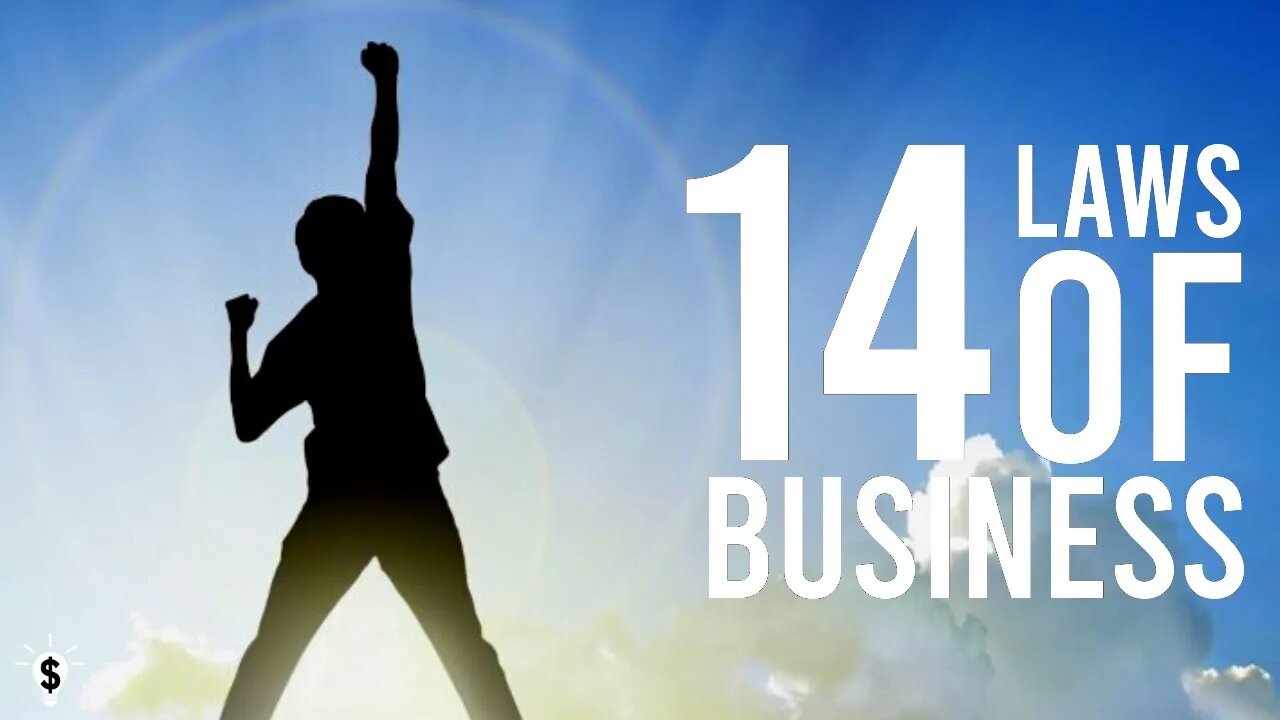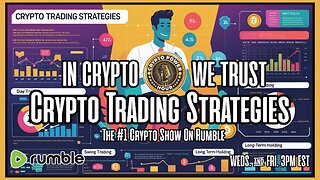Premium Only Content

14 Laws of Business That Change YOUR LIFE
Welcome to Financer, your place for business, finance, and wealth creation knowledge. Today we are going to reveal the 14 Laws of Business!
Law number one – 'You don't make money You take money.' Money isn't something you simply make out of thin air. You take it from someone else. You are not the federal reserve bank. You don’t print money. So you have to take it from someone. How do you do that? You have to provide value. Just like Bezos did with Amazon. He saw an opportunity in the booming internet industry and took it. He didn't make money; he took it from an opportunity that was lying in front of everyone. Every dollar in your pocket used to be someone else's. Don't focus on making money. Instead, focus on providing immense value. Find an opportunity, as Bezos did with the internet, and seize it. That's how you 'take' money.
[LAW 2] Host: "Now, onto our second law - 'Poor customers are bad customers'. No, we're not being rude, we're being realistic. A business cannot thrive on low-paying customers. As Patrick Bet-David once said, 'You're not running a charity; you're running a business. Remember who your ideal customers are.' Online businesses thrive when they target customers who see value in their offerings and are willing to pay for it.
Those who have more money, who are accustomed to a certain lifestyle, and for whom money holds a different kind of value, are the ones who are less likely to be overly frugal when it comes to spending it. They've got the money and they're willing to spend it on value-added services.
It's not that they're splurging mindlessly; it's just that they understand the concept of 'you get what you pay for' and are willing to pay for quality.
Poor customers, or rather customers with less disposable income, tend to be more frugal. Every dollar holds a higher value to them, and so they're more careful about where they spend it. They're more likely to haggle, to ask for discounts, to settle for less to save money. They're not bad people, but they can be bad for business, especially if your business model isn't designed to cater to that market. So, the takeaway from this law is - know your customers, know their purchasing power, understand the value they place on money, and then, shape your business strategy accordingly.
You'll find your business dealing with customers who appreciate your offerings and are willing to pay for it, rather than constantly haggling over prices.
[LAW 3] Host: "Next up, law number three - 'You get paid by the size of the impact of the problem you solved'. The bigger the problem you solve, the bigger the paycheck. Google didn't become a billion-dollar corporation by selling cookies. Even though today cookies are a big thing on the internet. They revolutionized how we access information. They solved a HUGE problem, and now they're reaping HUGE rewards.
Elon Musk said, 'If you get up in the morning and think the future is going to be better, it is a bright day. Otherwise, it's not.' And this very outlook is what has driven him to solve some of the biggest problems facing humanity today. Take Tesla, for instance. Before Tesla came along, electric cars were more of a novelty, an afterthought in the automobile industry.
But Musk saw the massive problem of dependence on fossil fuels and the adverse impact of carbon emissions. So, what did he do? He decided to make electric cars cool, fast, and most importantly, accessible.
Today, Tesla is a front-runner in the electric vehicle industry, and Musk has redefined transportation for the future. He identified a significant problem, presented a viable solution, and is now enjoying the rewards of that solved problem.
So, if you're asking yourself what business you should start or what product you should develop, stop looking for 'cool' ideas. Instead, look for problems, big problems, problems that affect a large number of people. Then find a solution to that problem. That's where your big paycheck lies. In the end, the size of the problem you solve directly impacts the size of the value you create. And the size of the value you create? Well, that directly impacts the size of your wealth.
[LAW 4] Law number four is 'Track everything and understand DATA.' In this digital era, data is the new oil. By understanding and analyzing your data, you can make informed decisions, eliminate guesswork, and strategize for future success. Think about it - every single click on Facebook is tracked, and that's how they can serve you such personalized ads. Remember, 'What gets measured, gets managed.
-
 1:51:44
1:51:44
The Quartering
2 hours agoHow I Destroyed My Channel, Iran Rejects US Talks, Minnesota Assassin Wife Set Free & PLAYING GAMES
143K65 -
 LIVE
LIVE
StoneMountain64
2 hours agoDON'T LET ME FALL FROM THE PEAK
238 watching -
 1:18:41
1:18:41
Sean Unpaved
3 hours agoFinals Frenzy, Manning Mania, & Fastball Feuds
13.9K -
 LIVE
LIVE
Crypto Power Hour
6 hours agoCrypto Trading Strategies You Need To Know
45 watching -
 LIVE
LIVE
Mally_Mouse
3 hours agoLet's Play!! Wii Sports Resort - GETTING ALL THE STAMPS!!
102 watching -
 22:10
22:10
Neil McCoy-Ward
2 hours ago🚨 U.S. Forces Prepare To END The Islamic Republic Of Iran
1.78K5 -
 1:58:27
1:58:27
The Charlie Kirk Show
3 hours agoTwo-Week Test + AMA | Sean Davis | 6.20.25
59.3K24 -
 LIVE
LIVE
GritsGG
3 hours agoWSOW Qualifiers! 👑 2587+ Ws
51 watching -
 2:02:53
2:02:53
Tim Pool
4 hours agoU.S. Says NUKING IRAN Is The Only Option, Should The US Intervene? | The Culture War with Tim Pool
208K217 -
 2:29:03
2:29:03
The Dilley Show
3 hours ago $10.20 earnedMAGA Mayhem Recap, USAID Bribes? and Q&A Friday! w/Author Brenden Dilley 06/20/2025
43.6K4